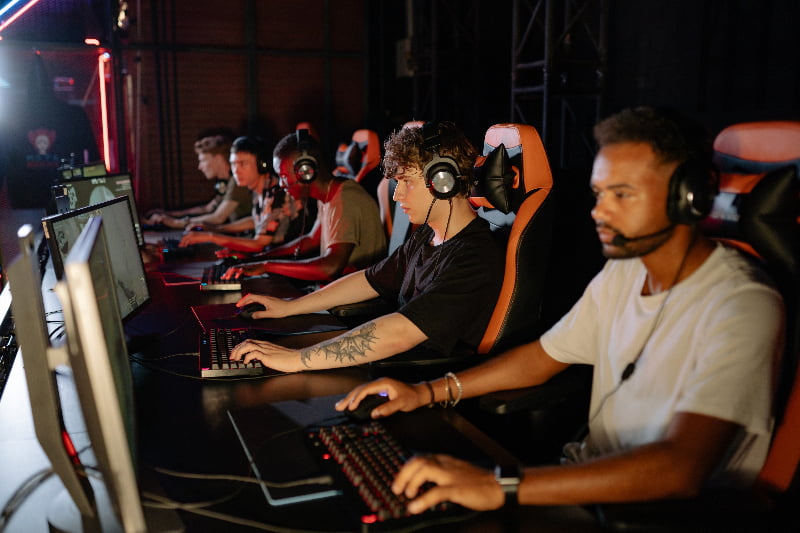Imagine this: you’ve just finished playing an incredible video game that left you wanting more. You’ve explored every corner of the game world, defeated every boss, and completed every quest. But you still crave new adventures and content. This is where DLC comes into play, offering you a way to extend your gaming experience and add fresh content to your favourite games.
DLC Meaning: What Does DLC Stand For In Gaming?
So I will walk you through the DLC Meaning, explore its significance in the gaming world, and discuss how it has revolutionized the way we experience video games. Whether you’re a seasoned gamer or just starting, understanding DLC is essential to fully enjoying and exploring the vast world of gaming.
Check Out: Is Gaming Good for Your Mental Health?
DLC Meaning Uncovered!
DLC stands for “Downloadable Content”. It is Additional Content for video games that are released after the game has been initially released. DLC can be anything from new maps and characters to new quests and modes. It can be purchased for a fee or included as part of a season pass.
DLC has become increasingly common in the gaming industry in recent years. It can be a way for developers to add new content to their games and keep players engaged. However, it has also been criticized for being overpriced and for fragmenting the gaming community. Ultimately, the decision of whether or not to purchase DLC is up to the individual player.
Types of DLC
Expansion packs
Expansion packs are the largest and most comprehensive type of DLC. They typically add new maps, characters, quests, and modes to the game. They can also add new features and mechanics. Expansion packs are typically priced higher than other types of DLC.
Season passes
Season passes are bundles of DLC that are released over some time. They can save players money if they plan on buying all of the DLC for a particular game. Season passes are typically priced lower than buying each piece of DLC individually.
Cosmetic items
Cosmetic items do not affect gameplay, but they can change the appearance of the player’s character or the game world. Cosmetic items can include new skins, clothes, weapons, and other accessories. Cosmetic items are typically priced lower than other types of DLC.
Microtransactions
Microtransactions are small pieces of DLC that can be purchased individually. They can include new weapons, items, or currency. Microtransactions are typically priced very low, but they can add up over time.

Pros and Cons of DLC
Pros
Extend the lifespan of the game
DLC can add new content to a game, such as new maps, characters, quests, and modes. This can extend the lifespan of a game and give players more to do. For example, the 2015 game “Fallout 4” had two major expansion packs, “Far Harbor” and “Nuka-World”, which added new quests, locations, and weapons to the game. These expansion packs extended the lifespan of the game by several hours and gave players more reasons to keep playing.
Provides additional value for gamers
DLC can provide additional value for gamers by offering new challenges, rewards, and experiences. This can make the game more replayable and enjoyable. For example, the 2017 game “Cuphead” had a DLC called “The Delicious Last Course”, which added a new playable character, new levels, and new bosses to the game. This DLC was well-received by critics and gamers, and it was seen as providing additional value for the base game.
Allows game developers to continue to support games after the release
DLC can help game developers to continue to support games after they have been released. This can be done by adding new content, fixing bugs, and balancing the game. For example, the 2016 game “Overwatch” has been supported with DLC for several years after its release. This DLC has included new heroes, maps, and modes, which has helped to keep the game fresh and exciting for players.
Gives players more control over the game they play
DLC can give players more control over the games they play by allowing them to choose which content they want to purchase. This can be a good thing for players who want to avoid spending money on content that they do not want. For example, the 2018 game “Destiny 2” has a season pass that gives players access to all of the DLC that is released during that season. However, players can also choose to purchase each piece of DLC individually. This gives players more control over how they spend their money.
Cons
Can be expensive
DLC can be expensive, especially if it is released in small chunks. This can be a barrier for some players, especially those who are on a budget. For example, the 2020 game “Cyberpunk 2077” had several pieces of DLC released after its launch, each of which cost $10. This could add up to a significant amount of money for players who wanted to purchase all of the DLC.
Can fragment the community
If not everyone has the same DLC, it can fragment the community. This can make it difficult to find people to play with, especially for online games. For example, the 2016 game “Destiny 2” had a season pass that gave players access to exclusive content. This meant that players who did not purchase the season pass were at a disadvantage, and it could make it difficult to find people to play with.
Can be used to nickel and dime players
Some developers have been accused of using DLC to nickel and dime players by releasing small pieces of content for high prices. This can be seen as a way to exploit players. For example, the 2018 game “Star Wars Battlefront II” had a loot box system that allowed players to purchase items that gave them an advantage in the game. This loot box system was criticized for being predatory and for encouraging players to spend money on items that they did not need.
Can be seen as unfinished games
Some players have argued that DLC is a way for developers to release unfinished games and then charge players for the content that should have been included in the base game. For example, the 2017 game “No Man’s Sky” was released with several bugs and missing features. The developers promised to add these features in future updates, but some players felt that they should have been included in the base game.
Development and Release
DLC development can begin during the development of the base game or after its release. If DLC development begins during the base game’s development, it is often called “day-one DLC”. Day-one DLC is controversial because some players feel that it should be included in the base game.
If DLC development begins after the base game’s release, it is often called “post-release DLC”. Post-release DLC can be developed by the game’s original developers or by third-party studios.
DLC can be released in a variety of ways. It can be released as a free update, as a paid download, or as part of a season pass.
How does Monetization Take Place and What are its Types?
DLC can be monetized in a variety of ways. The most common way is to sell it as a paid download. DLC can also be monetized through microtransactions, which are small purchases that can be made in-game. Microtransactions can be used to purchase items such as new weapons, skins, or currency.
Other ways to monetize DLC include:
- Season passes: A season pass is a bundle of DLC that is released over some time. Season passes can save players money if they plan on purchasing all of the DLC for a particular game.
- Free-to-play games: Free-to-play games are games that are free to download and play. However, they often have microtransactions that players can purchase to gain an advantage in the game.
- Loot boxes: Loot boxes are containers that contain random items. Loot boxes can be purchased with real money, and they can contain items such as new weapons, skins, or currency. Loot boxes have been criticized for being predatory and for encouraging players to spend money on items that they do not need.
- Impact of DLC On the Gaming Industry: DLC has had a significant impact on the gaming industry. It has allowed developers to continue to support games after they have been released. This has led to longer lifespans for games and more content for players to enjoy.
DLC has also been criticized for being overpriced and for fragmenting the gaming community. However, it remains a popular way for developers to make money and keep players engaged with their games.
Ethical Considerations of DLC
- Several ethical considerations that are needed to be taken into account when developing and releasing DLC. These include:
- Pricing: DLC should be priced fairly and should not be overpriced.
- Content: DLC should be of high quality and should not be released unfinished or buggy.
- Transparency: Players should be made aware of what content is included in DLC before they purchase it.
- Fairness: DLC should not give players who purchase it an unfair advantage over players who do not.
- Loot boxes: Loot boxes should be avoided or regulated to prevent them from being predatory.
Ultimately, the decision of whether or not to purchase DLC is up to the individual player. However, it is important to be aware of the ethical considerations involved before making a purchase.
Also Read: What Is FPS in Gaming?








